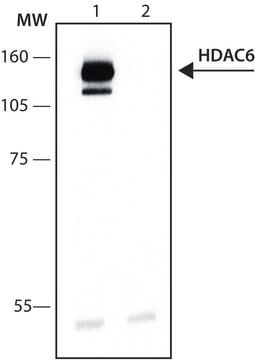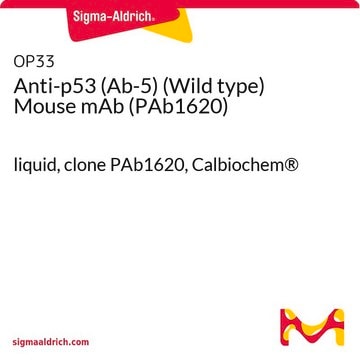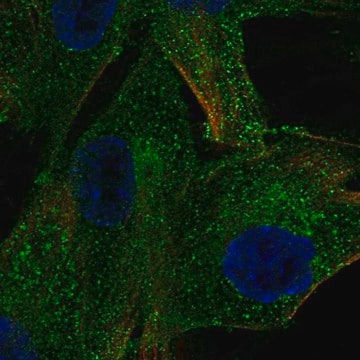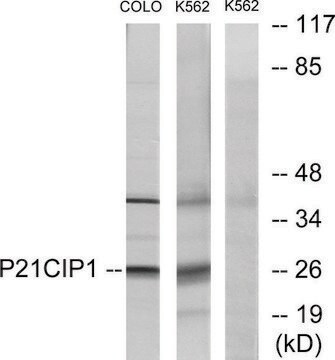P5813
Anti-p53 antibody, Mouse monoclonal
clone BP53-12, ascites fluid
Sinônimo(s):
Anti-TRP53, Anti-Transformation-related protein 53
Selecione um tamanho
Selecione um tamanho
About This Item
Produtos recomendados
fonte biológica
mouse
Nível de qualidade
conjugado
unconjugated
forma do anticorpo
ascites fluid
tipo de produto de anticorpo
primary antibodies
clone
BP53-12, monoclonal
peso molecular
antigen 53 kDa
contém
15 mM sodium azide
reatividade de espécies
human
técnica(s)
immunocytochemistry: suitable
immunohistochemistry (formalin-fixed, paraffin-embedded sections): 1:400 using methacarn-fixed, paraffin-embedded sections of human malignant tissue
immunohistochemistry (frozen sections): suitable
immunoprecipitation (IP): suitable
indirect ELISA: suitable
microarray: suitable
western blot: suitable using cell lysates from human cell lines known to express high levels of the p53 protein
Isotipo
IgG2a
nº de adesão UniProt
Condições de expedição
dry ice
temperatura de armazenamento
−20°C
modificação pós-traducional do alvo
unmodified
Informações sobre genes
human ... TP53(7157)
Procurando produtos similares? Visita Guia de comparação de produtos
Descrição geral
Imunogênio
Aplicação
- western blotting
- immunohistochemistry
- immunocytochemistry
- enzyme linked immunosorbent assay (ELISA)
Ações bioquímicas/fisiológicas
Exoneração de responsabilidade
Não está encontrando o produto certo?
Experimente o nosso Ferramenta de seleção de produtos.
produto relacionado
Código de classe de armazenamento
10 - Combustible liquids
Classe de risco de água (WGK)
WGK 3
Ponto de fulgor (°F)
Not applicable
Ponto de fulgor (°C)
Not applicable
Escolha uma das versões mais recentes:
Certificados de análise (COA)
Não está vendo a versão correta?
Se precisar de uma versão específica, você pode procurar um certificado específico pelo número do lote ou da remessa.
Já possui este produto?
Encontre a documentação dos produtos que você adquiriu recentemente na biblioteca de documentos.
Os clientes também visualizaram
Artigos
p53 regulates gene expression, cell cycle control and functions as a tumor suppressor. Inactivation of p53 is closely tied to cancer development.
Cancer stem cell media, spheroid plates and cancer stem cell markers to culture and characterize CSC populations.
Active Filters
Nossa equipe de cientistas tem experiência em todas as áreas de pesquisa, incluindo Life Sciences, ciência de materiais, síntese química, cromatografia, química analítica e muitas outras.
Entre em contato com a assistência técnica














